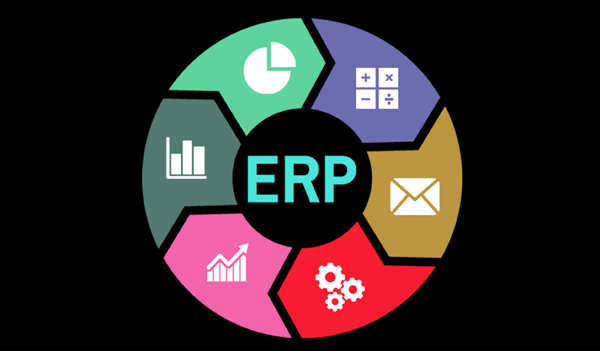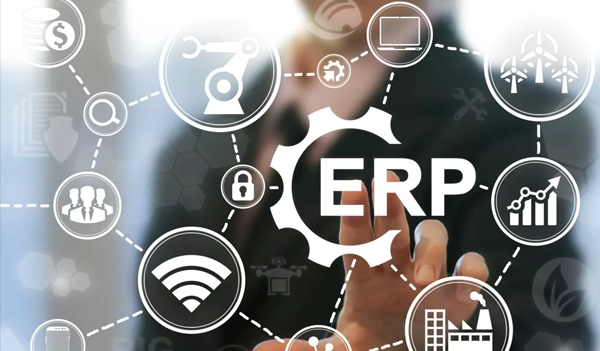ERP Program– In the fast-paced realm of modern business, staying ahead of the curve is not just an aspiration but a necessity. The dynamics of commerce demand a sophisticated approach to managing resources, operations, and information. This is where Enterprise Resource Planning (ERP) steps into the spotlight, donning the role of a digital maestro orchestrating the symphony of organizational processes.
ERP Program– In the fast-paced realm of modern business, staying ahead of the curve is not just an aspiration but a necessity. The dynamics of commerce demand a sophisticated approach to managing resources, operations, and information. This is where Enterprise Resource Planning (ERP) steps into the spotlight, donning the role of a digital maestro orchestrating the symphony of organizational processes.
What is ERP Program?

At its core, ERP is a comprehensive software solution designed to streamline and integrate various business processes across an organization. The acronym ERP stands for Enterprise Resource Planning, reflecting its primary function of planning and managing resources on an enterprise-wide scale.
The Essence of ERP
ERP systems are multifaceted platforms that consolidate diverse functions, such as finance, human resources, supply chain management, customer relationship management, and more. By providing a unified view of essential data and processes, ERP aims to enhance efficiency, reduce redundancies, and foster informed decision-making.
Navigating the ERP Landscape
Modules and Components
ERP is often modular, comprising distinct modules catering to different facets of business operations. Common modules include:
- Finance Module: Manages financial transactions, budgeting, and reporting.
- Human Resources Module: Handles employee data, payroll, and workforce management.
- Supply Chain Management Module: Orchestrates procurement, manufacturing, and distribution processes.
- Customer Relationship Management (CRM) Module: Focuses on customer interactions, sales, and service.
Each module acts as a specialized arm, contributing to the holistic functioning of the ERP ecosystem.
Integration and Centralization
The magic of ERP lies in its ability to break down silos within an organization. By integrating diverse functions, data, and processes into a centralized system, ERP promotes seamless communication and collaboration between departments. This not only expedites operations but also eradicates data discrepancies that often plague organizations operating with disparate systems.
Why ERP Matters
Boosting Efficiency
One of the paramount benefits of ERP is the boost it provides to operational efficiency. Tasks that once required manual intervention and were prone to errors can now be automated, allowing employees to focus on strategic activities rather than mundane, time-consuming tasks.
Real-time Insights
ERP systems provide real-time data, offering a panoramic view of the organization’s performance. This empowers decision-makers with timely insights, enabling them to make informed choices that can shape the future trajectory of the business.
Cost Savings
While the initial investment in an ERP system might seem substantial, the long-term cost savings are often substantial. By eliminating inefficiencies, reducing errors, and optimizing processes, ERP can contribute to significant cost savings over time.
Adaptability to Change
In the dynamic landscape of business, adaptability is a key survival skill. ERP systems are designed to evolve with the changing needs of an organization. They can be customized to accommodate growth, changes in processes, and new business requirements.
Implementing ERP: A Strategic Endeavor

Selecting the Right ERP System
Choosing an ERP system is akin to selecting a business partner. It requires careful consideration of various factors, including the organization’s size, industry, budget, and specific needs. The market is replete with ERP solutions, ranging from industry giants to niche players catering to specific sectors.
Customization and Integration
Once an ERP system is selected, customization becomes a critical phase. Tailoring the system to align with the unique processes of the organization is essential for maximizing its efficacy. Integration with existing systems and databases is also a pivotal step to ensure a seamless flow of information.
Training and Change Management
Introducing an ERP system often entails a cultural shift within an organization. Employees need to be trained to adapt to the new system, and change management strategies must be implemented to navigate the transition smoothly. This involves not just technical training but also fostering a mindset that embraces the advantages offered by ERP.
Challenges in the ERP Landscape
Implementation Complexity
The implementation of an ERP system can be a complex undertaking. It involves the collaboration of various stakeholders, including IT teams, department heads, and end-users. Coordinating these efforts and ensuring a smooth transition without disrupting day-to-day operations can be a considerable challenge.
Cost Overruns
While ERP systems promise long-term cost savings, the initial implementation cost can sometimes exceed the budget. Unforeseen challenges, customization requirements, and training costs can contribute to budget overruns if not managed diligently.
Resistance to Change
Employees accustomed to traditional processes may resist the shift to an ERP system. Overcoming this resistance requires effective communication, training programs, and showcasing the tangible benefits that the ERP system brings to the table.
Case Studies: Unveiling ERP Success Stories
Company A: Streamlining Manufacturing Operations
Company A, a leading manufacturing firm, implemented an ERP system to streamline its production processes. The ERP system enabled real-time tracking of inventory, optimized production schedules, and facilitated better coordination between different manufacturing units. As a result, Company A witnessed a significant reduction in production lead times and a noticeable increase in overall efficiency.
Company B: Revolutionizing Customer Relationships
For Company B, a player in the service industry, implementing an ERP system was a game-changer in customer relationship management. The CRM module of the ERP system allowed Company B to centralize customer data, track interactions across various touchpoints, and personalize service delivery. This not only improved customer satisfaction but also contributed to an increase in customer retention and loyalty.
The Future of ERP: Trends and Innovations
Cloud-based ERP
The advent of cloud technology has ushered in a new era for ERP systems. Cloud-based ERP solutions offer increased flexibility, scalability, and accessibility. Organizations can now leverage the power of ERP without the need for extensive on-premise infrastructure.
Artificial Intelligence (AI) Integration
AI is becoming an integral part of ERP systems, enhancing their capabilities in data analysis, automation, and decision-making. Machine learning algorithms embedded in ERP systems can learn from historical data, predict trends, and recommend optimal courses of action.
Mobile ERP
The workforce is increasingly mobile, and ERP systems are adapting to this trend. Mobile ERP applications empower employees to access critical information, approve workflows, and make decisions on the go. This not only improves efficiency but also aligns with the evolving nature of work.
Conclusion
In the ever-evolving landscape of business, where change is the only constant, ERP stands as a stalwart ally. It is not merely a software solution; it is a strategic imperative for organizations aspiring to thrive in the digital age. From boosting efficiency to revolutionizing customer relationships, ERP is the conductor orchestrating a harmonious blend of people, processes, and technology.
As we look to the future, the trajectory of ERP is marked by trends such as cloud adoption, AI integration, and mobile accessibility. These innovations promise to propel ERP systems into new frontiers, further enhancing their ability to catalyze organizational success.
In essence, ERP is not just a program; it is a transformative force that reshapes the DNA of organizations, enabling them to navigate the complexities of the business landscape with agility and resilience. So, as we embrace the era of digital transformation, let ERP be our guiding melody, harmonizing the disparate notes of business into a symphony of success.